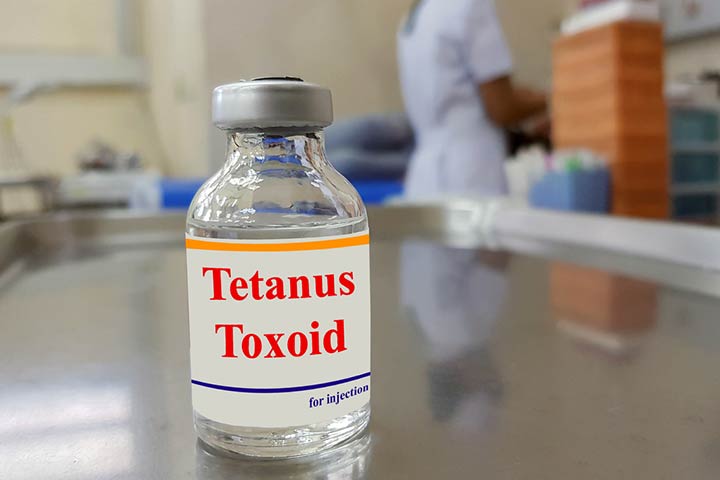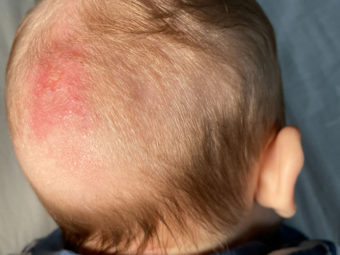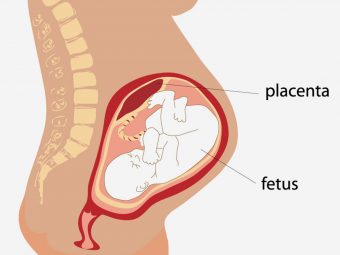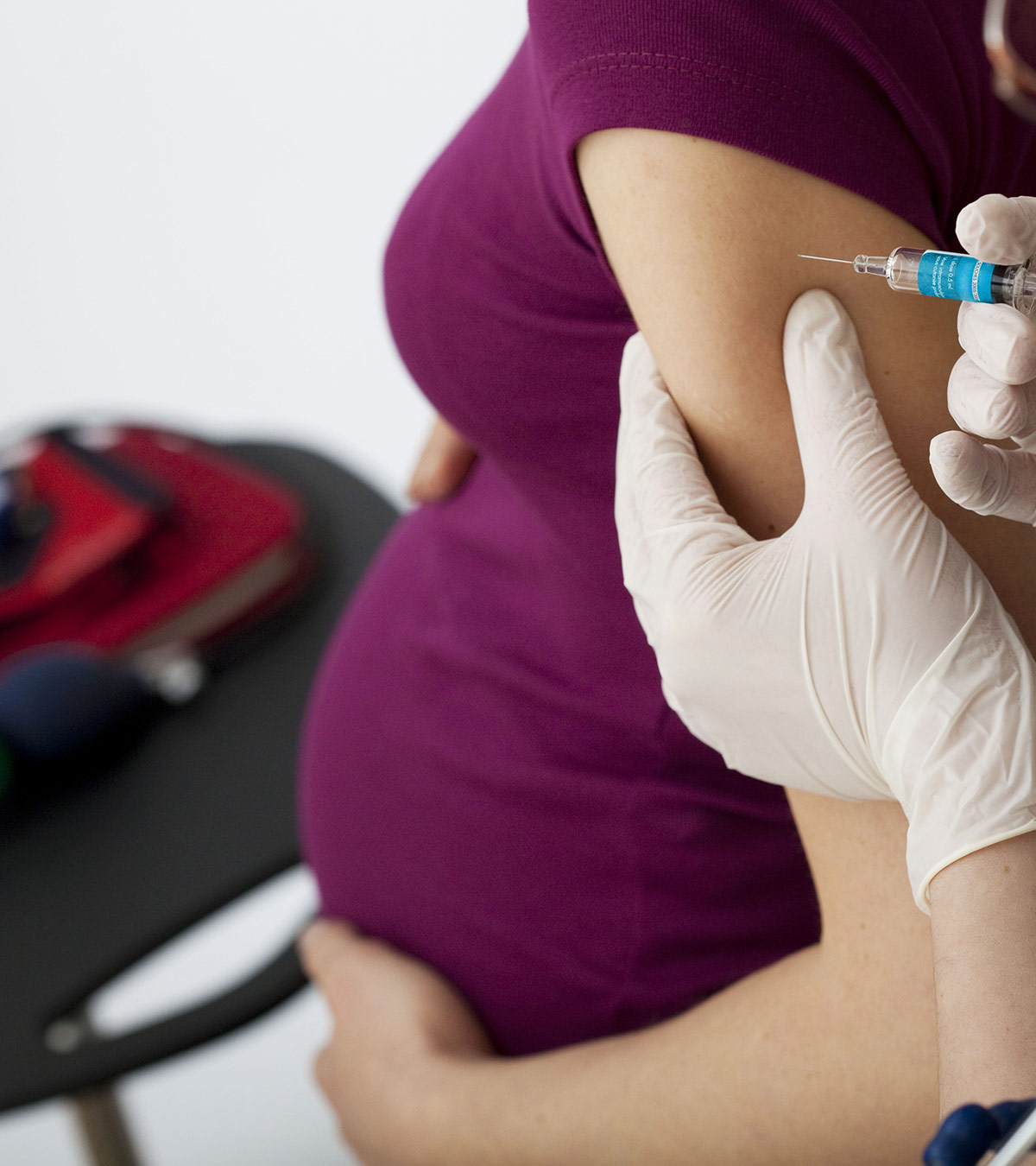
Image: Shutterstock
Tetanus is a bacterial infection caused by Clostridium tetani and has no specific cure. Receiving Tetanus toxoid (TT) vaccination during pregnancy is crucial for women. According to the World Health Organization (WHO), most reported cases of tetanus in newborns and mothers were associated with insufficient maternal immunizations (1).
Read to understand more about the safety and effectiveness of tetanus toxoid vaccination, its types, and administration time.
What Is A TT Injection?
TT vaccine helps prevent and treat tetanus infection. Tetanus antitoxins are given alone only when needed for wound prophylaxisiXTreatment taken to prevent disease . Usually, it is available in combination with diphtheria toxoidiXA vaccine against diphtheria, an acute upper respiratory illness and acellular pertussisiXA contagious respiratory illness caused by bacteria vaccine (Tdap). Toxoids are inactivated, and purified toxin strains from the bacteria. They are sterilized and lack pathogenic properties to trigger infection and activate an immune response (2).
Is Tetanus Toxoid Vaccine Safe In Pregnancy?
Tetanus toxoid, diphtheria toxoid, and acellular pertussis (Tdap) vaccines are safe for the mother and the unborn baby. It can be administered at any time during pregnancy. There have not been any immunization safety warnings issued or found after Tdap administration in both the mother and the baby (3). However, specific timings are often recommended for better outcomes. The US CDC and the Food And Drug Administration (FDA) regulate and monitor the safety and effectiveness of vaccines through a Vaccine Adverse Event Reporting System (VAERS).
The US CDC and the American College of Obstetricians and Gynecologists (ACOG) say that the benefits of the Tdap vaccine outweigh the theoretical risk of severe hypersensitivity due to multiple shots (3). However, according to a Centers for Disease Control and Prevention (CDC) survey, only 44% of women reported receiving the Tdap vaccine during pregnancy.
Why Do You Need The TT Injection (TT Vaccine) In Pregnancy?
TT vaccine is the only way to prevent maternal and neonatal tetanus. According to the US Centers For Disease Control And Prevention (CDC), nearly all cases of tetanus occur in unvaccinated persons. Although vaccine recommendations may vary, people of all ages, including pregnant women, can get the Tetanus vaccine (4).
Most countries follow a universal standard for TT immunization in maternal prenatal care (1). Women who had an unsafe abortion and those who carry a tetanus-prone wound should go for TT vaccination to prevent tetanus risks (5). It is also important to administer the TT vaccine in rural areas to ensure adequate immunization coverage since deliveries happen in unsafe conditions.
Maternal Tetanus And Neonatal Tetanus
Inadequate maternal vaccination and unhygienic delivery or perinataliXThe period that starts at about 20 to 28 weeks pregnant and ends at about one to four weeks after childbirth practices could lead to maternal or neonatal tetanus. Both maternal and neonatal tetanus can be eliminated together as the risk factors are similar or related.
Maternal Tetanus
The World Health Organization (WHO) defines maternal tetanus as the tetanus during pregnancy or within six weeks after childbirth, miscarriage, or an abortion (6).
The tetanus bacteria can easily pass through an open wound into the mother’s body. Anything from light scratches on the skin to a deep wound caused by a bite, burn, or lacerationsiXA deep cut or tear in the skin or flesh can aid bacterial skin penetration. Once the bacteria enters the skin, it produces a toxin known as tetanospasmin in the bloodstream. It thus attacks the nervous system, leading to maternal mortality if not treated on time. The incubation period of the bacterium varies from 3 to 21 days (7).
The symptoms of tetanus are lockjaw (mild contractions of the jaw muscles), stiffness in the neck, abdominal muscles, spinal fractures, and swallowing difficulty. Some rare signs include fever, sweating, and rapid heartbeat (7).
Neonatal Tetanus
Neonatal tetanus is a life-threatening condition that affects newborns because of the use of unsterilized cutting instruments and unhealed umbilical cord stumps. Babies are affected because they have no immunity that passes from the mother who has not been immunized. It is, therefore, of high importance that pregnant women should take the TT vaccine (8).
Tetanus is preventable by vaccination (1). Antibodies or immunoglobulins form in your body after vaccination, passing to your little one and protecting them for months after birth. ACOG also recommends that other family members, including fathers, grandparents, caregivers, or anyone in close contact with newborns, get TT vaccines two weeks before coming in contact with newborns. All healthcare workers involved in newborn care are also up to date on their TT vaccines.
 Quick fact
Quick factWhat Are The Steps To Be Taken Before Taking The TT Vaccine?
The immunization will only be given after thoroughly screening your medical reports. Health care providers may also ask about the vaccine history and known allergies or side effects on previous shots.
The healthcare provider may shake the vial containing the vaccine vigorously so that the sediment properly mixes with the fluid. A shake test is compulsory to ensure that the vial is not damaged while being frozen and thawed. Vaccines that are previously frozen should not be used (9).
When Should A Pregnant Woman Take Tetanus Injection?
The American College of Obstetricians and Gynecologists (ACOG) recommends getting Tdap vaccination between 27 and 36 weeks of gestation. This time window maximizes the maternal immune response and passive antibody transfer in the newborn. However, Tdap can be safely administered anytime during the pregnancy (10).
Wound management, pertussis outbreaks, or other extenuating situations can be reasons for earlier or later administration of Tdap vaccines in pregnancy. There is no adverse effect though it is administered other than the recommended time frame (10).
What Is The Ideal TT Injection Dosage In Pregnancy?
The immunization schedule recommended by the American Congress of Obstetrics and Gynecologists (ACOG) for pregnant women is as follows (10).
Recommendations for unvaccinated and not known immunization history
If the pregnant woman has never been vaccinated before or her immunization results are not known, two doses of TT/Td are given one month before delivery and further doses as per table one.
| DOSE OF TT OR TD (ACCORDING TO CARD OR HISTORY) | WHEN TO GIVE | EXPECTED DURATION OF PROTECTION |
| 1 | At first contact or as early as possible in pregnancy | None |
| 2 | At least 4 weeks after TT1 | 1-3 years |
| 3 | At least 6 months after TT2 or during subsequent pregnancy | At least 5 years |
| 4 | At least one year after TT3 or during subsequent pregnancy | At least 10 years |
| 5 | At least one year after TT4 or during subsequent pregnancy | For all childbearing age years and possibly longer |
Recommendations for known vaccine history
- If the pregnant woman had 1 to 4 TT doses earlier, the remaining one dose of TT/Td could be given before delivery.
- If the pregnant woman shows vaccination proofs of her infancy, childhood, and adolescence of tetanus-containing vaccines like TT, Td, DTP, or DT, doses are given as per table two.
| AGE AT LAST VACCINATION | PREVIOUS IMMUNIZATIONS (BASED ON WRITTEN RECORDS) | RECOMMENDED IMMUNIZATIONS | |
| AT PRESENT CONTACT/PREGNANCY | LATER (AT INTERVALS OF AT LEAST ONE YEAR) | ||
| Infancy | 3 DTP | 2 doses of TT/Td (min.4 weeks interval between doses) | 1 dose of TT/Td |
| Childhood | 4 DTP | 1 dose of TT/Td | 1 dose of TT/Td |
| School age | 3 DTP + 1 DT/Td | 1 dose of TT/Td | 1 dose of TT/Td |
| School age | 4 DTP + 1 DT/Td | 1 dose of TT/Td | None |
| Adolescence | 4 DTP + 1 DT at 4-6 yrs + 1 TT/Td at 14-16 yrs | None | None |
For complete protection during pregnancy, the last TT dose should be given two weeks before delivery.
The doses are recorded on a personal immunization card that a woman should keep with her.
How Many TT Injections Are Given During Pregnancy?
The number of TT injections and their booster doses in pregnancy may vary depending on the previous vaccine history and number of pregnancies.
First pregnancy recommendations
The first pregnancy TT recommendations may include (11):
- A dose of Tdap is administered during each pregnancy regardless of prior history of getting Tdap.
- Three doses of Tdap are given to pregnant women who have never been vaccinated or whose medical history is unknown. It is usually recommended for 0, 4 weeks, and 6 through 12 months.
Second pregnancy recommendations
Your healthcare provider will review your vaccination history and recommend doses accordingly during your antenatal care check-ups (11).
- If you have received two doses of Tdap during the first pregnancy, you may be given a third dose during the second pregnancy.
- If the subsequent pregnancy occurs after a long gap, the vaccination schedule will differ depending on your previous Tdap doses since the duration of protection may vary for each dose. Your doctor will assess your vaccination card and schedule the doses accordingly.
If you get hurt after taking any TT vaccine doses, you do not require any shots immediately. The vaccine will start forming antibodies that protect your body from infectious diseases. It is also better to check with your doctor if you have serious injuries.
What Are the Side Effects of TT Injection During Pregnancy?
There are no specific or concerning side effects for TT vaccines during pregnancy. Side effects of Tdap vaccinations, even in pregnant women, can be mild or moderate severity and self-resolving. Severe side effects are rare in the adult population (12).
The common Tdap side effects may include:
- Injection site pain, tenderness, redness, or swelling
- Fever
- Fatigue
- Body aches
These effects may last for a day or two and resolve without complications. Usually, these symptoms occur as a result of the initiation of the immune response against the inactive toxins or bacterial material in the vaccine.
Frequently Asked Questions
1. Is tetanus injection compulsory during pregnancy?
Tetanus vaccination is necessary during each pregnancy to ensure fetal protection (10).
2. Can I refuse a tetanus shot during pregnancy?
It is not advisable to refuse tetanus vaccination (Tdap vaccination) when pregnant since it is safe for the mother and the fetus. Unlike often believed, it does not increase the risk of fetal growth restriction, preeclampsiaiXA pregnancy disorder characterized by high blood pressure, water retention, and protein content in urine , preterm birth, or stillbirth. Developmental risk to the newborn has not been identified either (13).
3. What is the maximum time limit for tetanus injection?
The US CDC recommends a Td or Tdap vaccine booster every ten years in people who have already received primary vaccinations (14). However, the maximum time limit for pregnant women may vary considering the benefits of vaccines to the newborns and the mother.
4. Is TT injection painful in pregnancy?
TT injections can be slightly painful for everyone, including pregnant women. New vaccine manufacturing technologies focus on developing vaccines that cause less local reactions such as pain with desired immune response.
5. How much does TT injection cost?
The vaccine cost may vary depending on the provider and your healthcare plans. In the US, the cost for TT combination vaccines in the private sector range between 24 and 100 dollars depending on the manufacturer and between 18 and 50 dollars in the public sector. You may get these vaccines free of cost by enrolling in national immunization programs or much cheaper in other countries (15) (16).
Naturally lowered immunity during pregnancy exposes a mother to several infections, such as tetanus. Hence, taking tetanus toxoid vaccination during pregnancy is essential. TT vaccination provides the mother and the baby with antibodies against tetanus. Following optimum hygiene practices during delivery is also essential to protect the mother and the neonate from tetanus. Two doses of TT vaccine are given before delivery to mothers who have not been vaccinated or whose vaccination status is unknown.
Infographic: Do TT Injections Have Side Effects During Pregnancy?
Most side effects of Tdap vaccination, even during pregnancy, are usually mild or moderate and go away on their own. This infographic highlights the common side effects of TT injection and provides valuable information for expectant mothers.
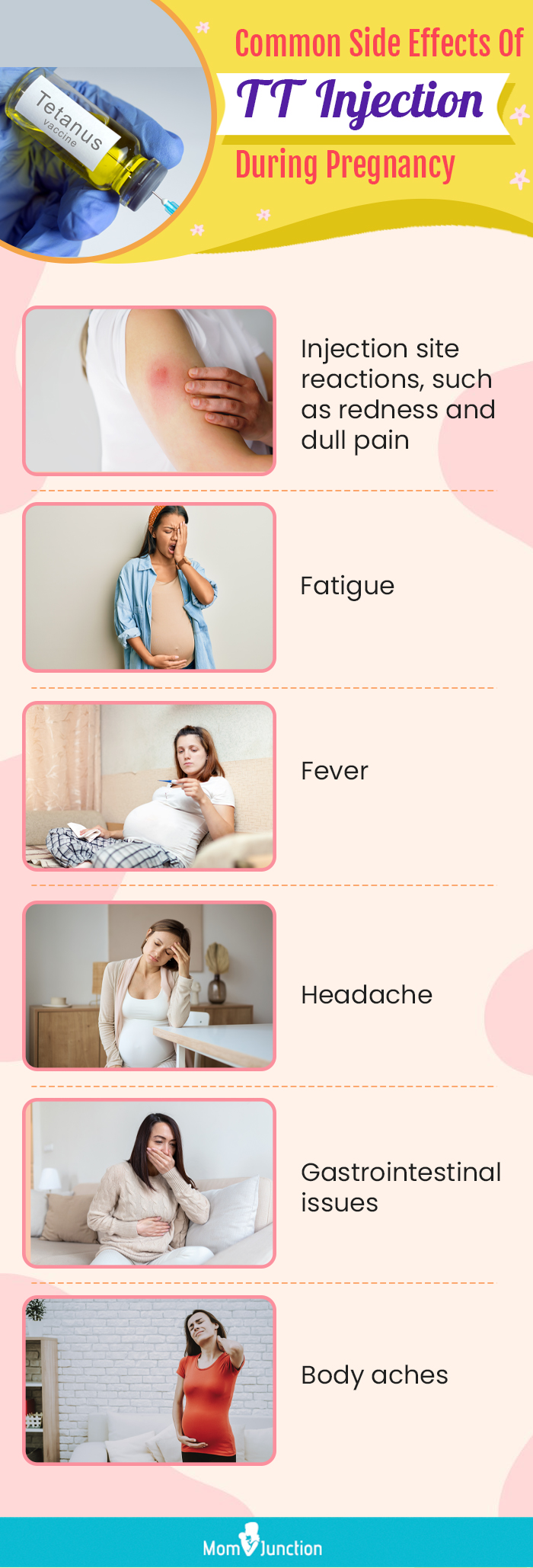
Illustration: Momjunction Design Team
Key Pointers
- Vaccination with Tetanus toxoid (TT) during pregnancy is crucial to prevent infections.
- The Tdap vaccine is safe for both the mother and fetus during pregnancy.
- TT vaccine protects against maternal and neonatal tetanus.
- Pregnant women should receive the Tdap vaccine between 27-36 weeks gestation.
- TT vaccination may cause mild to moderate self-resolving side effects such as injection site pain, fever, fatigue, and body aches.
References
- Tetanus.
https://www.who.int/news-room/fact-sheets/detail/tetanus - Thomas Rabadi And Mark F. Brady; Tetanus Toxoid.
https://www.ncbi.nlm.nih.gov/books/NBK557415/ - Get the Whooping Cough Vaccine During Each Pregnancy.
https://www.cdc.gov/pertussis/pregnant/mom/get-vaccinated.html - Tetanus Vaccination.
https://www.cdc.gov/tetanus/vaccination.html - Protecting All Against Tetanus.
https://www.who.int/docs/default-source/tetanus/9789241515610-eng.pdf?sfvrsn=8b4e845a_2 - Maternal And Neonatal Tetanus Elimination.
https://www.who.int/southeastasia/activities/sustaining-maternal-and-neonatal-tetanus-elimination/maternal-and-neonatal-tetanus-elimination - Causes and Transmission.
https://www.cdc.gov/tetanus/about/causes-transmission.html - Neonatal Tetanus.
https://www.pemj.org/journal/view.php?number=121 - The Shake Test.
https://www.open.edu/openlearncreate/mod/oucontent/view.php?id=53354§ion=1.5.3 - Update on Immunization and Pregnancy: Tetanus Diphtheria and Pertussis Vaccination.
https://www.acog.org/clinical/clinical-guidance/committee-opinion/articles/2017/09/update-on-immunization-and-pregnancy-tetanus-diphtheria-and-pertussis-vaccination - Guidelines for vaccinating pregnant women.
https://www.cdc.gov/vaccines/pregnancy/hcp-toolkit/guidelines.html - Whooping Cough Vaccines are Safe but Side Effects Can Occur.
https://www.cdc.gov/pertussis/pregnant/mom/safety-side-effects.html - Jonathan D. Emery and Daniel Moussa; (2021); Vaccination in pregnancy: A call to all providers for help.
https://www.ccjm.org/content/88/3/157 - Diphtheria Tetanus and Pertussis Vaccine Recommendations.
https://www.cdc.gov/vaccines/vpd/dtap-tdap-td/hcp/recommendations.html - Archived CDC Vaccine Price List as of January 1 2020.
https://www.cdc.gov/vaccines/programs/vfc/awardees/vaccine-management/price-list/2020/2020-01-01.html - Free whooping cough and influenza vaccines for pregnant women.
https://www.health.gov.au/news/free-whooping-cough-and-influenza-vaccines-for-pregnant-women# - Fast Facts On Global Tetanus.
https://www.cdc.gov/globalhealth/immunization/diseases/tetanus/data/fast-facts.html





